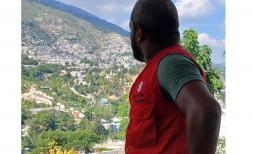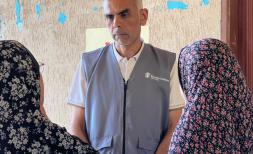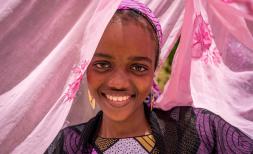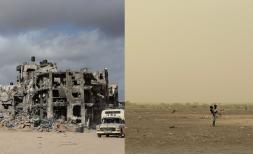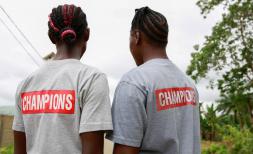Maya's* story: Fighting for girls’ rights during coronavirus
When Maya* was 7 years old she fled Syria with her family. Today she is 14 and lives in Za’atari refugee camp in Jordan with her two brothers and mother. The dusty camp is currently home for over 75,000 Syrians – more than half of whom are children.
We spoke to Maya about her life in the camp and how it has changed due to coronavirus.
I’m 14 years old, and I’m from Syria. We came to Za’atari camp in 2013. I remember when I used to go to my grandfather’s house in Syria, but that’s all I remember from Syria.
I was very shy when I started coming to the Save the Children centre. Even at school, or at home, I would always sit by myself. I would sit alone, and I wouldn’t go out, or try to meet new friends. I used to be very angry.
But later, after I started coming to the centre, I met many new friends. I even know how to talk to people in my neighbourhood with a good, positive spirit.
I also signed up for advocacy support from Save the Children. We focus on solutions to three issues: women’s empowerment, child marriage and child labour. We started initiatives, we gave out brochures and we organised awareness sessions for parents.
Life in quarantine
Of course my life has changed now we are in quarantine. I don’t go to school or the Save the Children centre anymore. People changed their habits, not shaking hands, staying away from crowds and not going out of the house much.
If coronavirus hits the camp, people will be frightened. It will spread quickly because the camp is highly populated and our houses are next to each other.
I don’t see my friends. I miss the people I love a lot. Almost all children around the world are in the same situation.
We don’t go to school now. But I keep up with my lessons through TV, and I take pictures of my homework and send them to my teachers via WhatsApp. I miss my school so much because it is my second home, and I miss my teachers.
What scares me the most about coronavirus is if it hits someone I love - like my family, friends or my teachers. I am worried about everyone I love.
I hope this quarantine doesn’t last long and everyone goes back to their school, job and work.
The situation for girls in the camp
The challenges that girls face here at the camp are early marriage, [a lack of] women's empowerment, child labour, dropping out of school and harassment.
It’s very important for us to defend the rights of girls. A girl is the most vulnerable person in a family. She is always quiet and patient. She cannot defend her rights, or express her opinions. For example, everything goes to the boys. Education goes to the boys. But parents take girls out of school and marry them off.
I don’t want this to happen. I always tell girls to defend their rights, to defend their roles, and to be the voice of all women in the community. I tell them don’t stay quiet, and most importantly, don’t be quiet.
Early marriage ruins a girl’s life, and ends it completely. It makes a girl miss out on many opportunities like education, or living freely. It ruins her life and has psychological and physical effects on her.
It prevents her from getting a degree.
We have a saying here “your degree is your weapon”. A woman’s degree is her weapon, meaning without one, she will not be able to get a job, or anything else in this life. So women’s empowerment helps a woman to work and get her own income, which no one can control but her.
Standing up for girls in Za’atari
My recommendation is that girls do not drop out of school, that’s the first thing. We must prevent early marriage and prevent harassment.
The challenge I face is that sometimes adults don’t really listen to us and think we’re talking about regular or silly things. But we are talking about things that are very big and important to us.
What we are doing now, is awareness sessions for parents. There are some parents who listen and help us defend our rights with us, but others don’t. They tell us, “No! Child marriage is a normal thing to do, and we’ve been doing it for a long time. We cannot give up our traditions.”
They don’t really understand. But we keep on trying, and if they are stubborn, we will be even more stubborn, and eventually we will end child marriage.
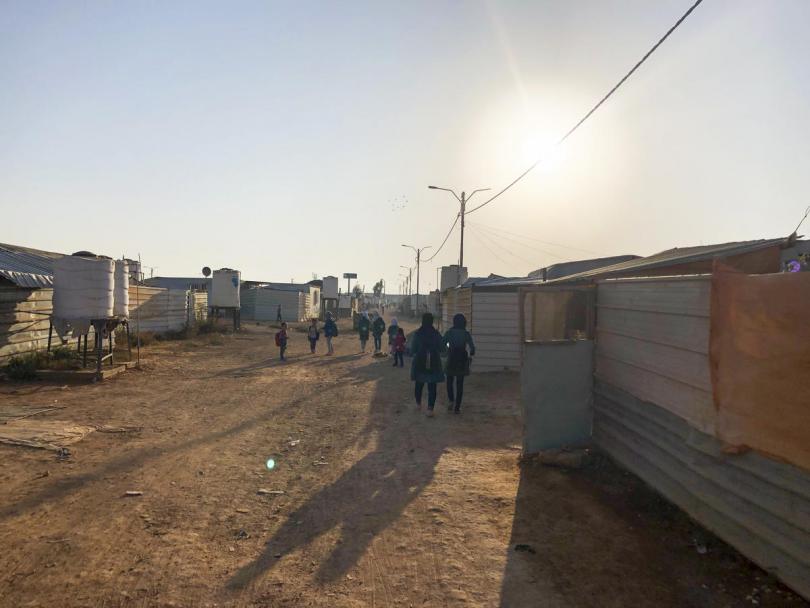
Za'atari refugee camp, Jordan.
I would like to send a message to the parents at Za’atari camp, to stop following all of our traditions.
A girl has dreams, a future, and many other things. One small thing can ruin everything for her. So instead of seeing your daughter grow up to be an engineer, a doctor, or a pharmacist, to be happy for her and to see her success, you are ruining her future and ambitions. A child does not raise a child.
Maya takes part in Save the Children’s co-created Coaching for Life project with The Arsenal Foundation. The project aims to build the resilience of children affected by conflict and violence in Za’atari refugee camp. Children like Maya participating in the programme have been given advocacy training and a platform to speak out about the issues that matter to them.
Save the Children is responding to the coronavirus pandemic in Jordan, and is working to raise awareness of coronavirus, supporting families so they know how best to keep themselves safe from the virus. Teams are adapting existing programmes so children and their families can continue to receive much needed health, protection, cash and education support throughout the crisis.
Read more about our response to coronavirus.
*Name changed to protect identity.
